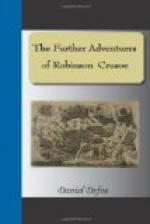It was talking one night with a certain prince, one of the banished ministers of state belonging to the Czar, that the discourse of my particular case began. He had been telling me abundance of fine things of the greatness, the magnificence, the dominions, and the absolute power of the Emperor of the Russians: I interrupted him, and told him I was a greater and more powerful prince than ever the Czar was, though my dominion were not so large, or my people so many. The Russian grandee looked a little surprised, and, fixing his eyes steadily upon me, began to wonder what I meant. I said his wonder would cease when I had explained myself, and told him the story at large of my living in the island; and then how I managed both myself and the people that were under me, just as I have since minuted it down. They were exceedingly taken with the story, and especially the prince, who told me, with a sigh, that the true greatness of life was to be masters of ourselves; that he would not have exchanged such a state of life as mine to be Czar of Muscovy; and that he found more felicity in the retirement he seemed to be banished to there, than ever he found in the highest authority he enjoyed in the court of his master the Czar; that the height of human wisdom was to bring our tempers down to our circumstances, and to make a calm within, under the weight of the greatest storms without. When he came first hither, he said, he used to tear the hair from his head, and the clothes from his back, as others had done before him; but a little time and consideration had made him look into himself, as well as round him to things without; that he found the mind of man, if it was but once brought to reflect upon the state of universal life, and how little this world was concerned in its true felicity, was perfectly capable of making a felicity for itself, fully satisfying to itself, and suitable to its own best ends and desires, with but very little assistance from the world. That being now deprived of all the fancied felicity which he enjoyed in the full exercise of worldly pleasures, he said he was at leisure to look upon the dark side of them, where he found all manner of deformity; and was now convinced that virtue only makes a man truly wise, rich, and great, and preserves him in the way to a superior happiness in a future state; and in this, he said, they were more happy in their banishment than all their enemies were, who had the full possession of all the wealth and power they had left behind them. “Nor, sir,” says he, “do I bring my mind to this politically, from the necessity of my circumstances, which some call miserable; but, if I know anything of myself, I would not now go back, though the Czar my master should call me, and reinstate me in all my former grandeur.”
He spoke this with so much warmth in his temper, so much earnestness and motion of his spirits, that it was evident it was the true sense of his soul; there was no room to doubt his sincerity. I told him I once thought myself a kind of monarch in my old station, of which I had given him an account; but that I thought he was not only a monarch, but a great conqueror; for he that had got a victory over his own exorbitant desires, and the absolute dominion over himself, he whose reason entirely governs his will, is certainly greater than he that conquers a city.




